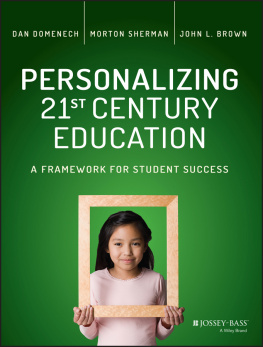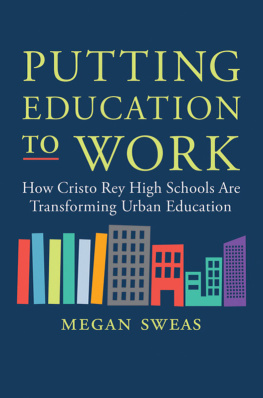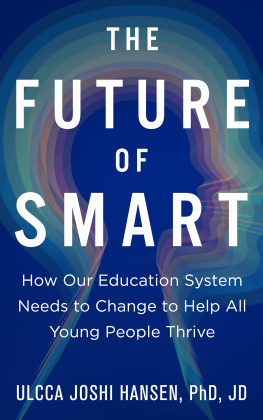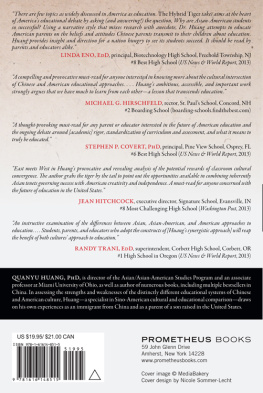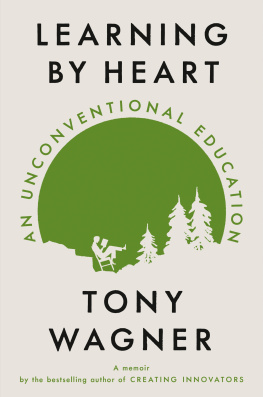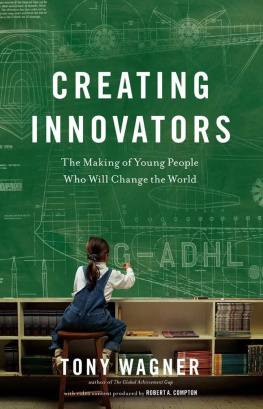Thank you for downloading this Scribner eBook.
Join our mailing list and get updates on new releases, deals, bonus content and other great books from Scribner and Simon & Schuster.
C LICK H ERE T O S IGN U P
or visit us online to sign up at
eBookNews.SimonandSchuster.com
CONTENTS
To Americas teachers
There are no two ways about itteaching is demanding. Were counting on our teachers to shape and transform our next generation, but we pay them salaries comparable to that of someone who works at a rental car counter. We expect them to deal with learning, family, motivational, and life issues for hundreds of students yet decide that they are so untrustworthy that we need to hold their feet to the fire with nonsensical standardized tests. We blame them when things dont go exactly the way we wantwith a given child, class, school, or national cohortyet we do next to nothing to support them. Yet they persevere, and come to school every day committed to helping our kids become better people. So, to our teachers, we say thank you, and hope that this book, and the documentary Most Likely to Succeed , will help you in your important mission.
INTRODUCTION
T his book is a product of an unlikely collaboration that began with a breakfast in Cambridge, Massachusetts, on a snowy day in early 2012.
We come from very different worlds. Tony Wagner has spent his career in the world of education. He taught English for more than a decade, ran a school, got a doctorate from Harvards Graduate School of Education, started an education-related nonprofit, is a frequent keynote speaker at major conferences around the world, and has written five books on education. His body of work points the way toward a completely reimagined education system, one optimized for a world of innovation and the complexities of twenty-first-century citizenship. His two most recent books, The Global Achievement Gap and Creating Innovators , have sold almost a quarter of a million copies, received widespread critical acclaim, and have been translated into more than ten languages.
Ted Dintersmith spent his career in the world of technology and innovation. He got his PhD in Engineering from Stanford and then ran a start-up making the semiconductors that helped enable the digital revolution. The majority of his career has been in the field of venture capital, as a senior partner with one of the nations top-tier early-stage venture firms, Charles River Ventures. Hes been on the board of directors of the National Venture Capital Association, championed their national competitiveness initiative, and was ranked by Business 2.0 as the top-performing venture capitalist in the United States during the period 19951999.
A few years ago, Ted began directing more of his focus toward education. As a father of two school-aged children, he was concerned by what he saw as a disconnect between schools and an increasingly innovative world. He knew that rapid advances in innovation were eliminating traditional jobs from the economy. Workers performing routinized tasks were becoming an endangered species. Companies wanted to hire creative problem-solvers able to continually invent ways to add value to their organizations, but found few of them graduating from our schools. Alarmingly, the schools he visited seemed intent on crushing the creativity out of studentserasing the very skills that would have allowed them to thrive.
Ted began meeting with education experts to learn more. These meetings were highly informative, but they often ended with, Well, the person you really need to meet is Tony Wagner. After reading Tonys books, Ted sent him a blind email, asking him to get together on one of Teds upcoming trips to Boston. Tony agreed, and a one-hour breakfast turned into a three-hour discussion about how our obsolete education system was stymieing the innovation crucial to success in todays economy.
By the end of the breakfast, the two of us found that, despite vast differences in professional backgrounds, we shared convictions that could be distilled to these points:
Rapid advances in innovation are eliminating structured routine jobs from our economy, leaving millions of young Americans at risk;
The critical skills young adults need in the twenty-first century for careers in the world of innovation, and for responsible citizenship, are the very skills the school years eviscerate;
The education policies our country is pursuing to fix schools only serve to harm students and disillusion teachers;
While education credentials were historically aligned with competencies that mattered, they have become prohibitively expensive, emotionally damaging, and disconnected from anything essential;
Unless we completely reimagine school, the growing divide between the haves and have-nots will threaten to rip civil society apart; and,
We have an urgent obligation to speak out, since we know what our education system needs to do to give every student a fighting chance in life.
That initial three-hour breakfast conversation subsequently blossomed into a daily collaboration. The two of us have worked closely with award-winning documentarian Greg Whiteley on a feature-length film on education, Most Likely to Succeed, which premiered at the prestigious Sundance Film Festival in January 2015. The documentary has served as the foundation for a broad and ambitious initiative we are launching to help schools move forward. Together, the documentary, the outreach initiative, and this book provide a framework for reimagining school.
What Mattered to You
When we talk to people, we always find it revealing to inquire about their school experiences; weve all been students. For starters, we thought it might help if we provide a bit of context on our own school experiences.
Tony hated school, had average SATs, and went to two nondescript colleges before finally earning his BA degree at what was then one of the most experimental (but equally anonymous) undergraduate programs in the country. He went on to earn a Master of Arts in Teaching and a Doctorate in Education at Harvard University, where he found himself to be a complete outlier. While at the Harvard Graduate School of Education, Tony was almost constantly at odds with the mainstream of education, and he developed his views despite what was covered in classrooms. Tony is an example of someone who survived the education system and went on to have a successful career as an author, speaker, and consultant. And hell be the first to admit that a doctorate from Harvard has a sort of Wizard of Oz benefitthe credential is important largely because everyone thinks its important.
Ted has an innate ability to do simple math problems quickly. While this skill is of limited value in life, it was his best friend in school. He never missed a point on a standardized math test, and excelled at his math and physics courses. Only when he went to Stanford for graduate school did he realize that what is required to be a great physicist has almost nothing to do with what is required to be a great physics student. Fortunately for his career prospects, after earning an MS in Applied Physics and a PhD in Engineering from Stanford University, he switched out of physics into technology and innovation, where he experienced considerable success. He is now an active education philanthropist, providing guidance and funding to several high-potential organizations seeking to move education into the twenty-first century.


